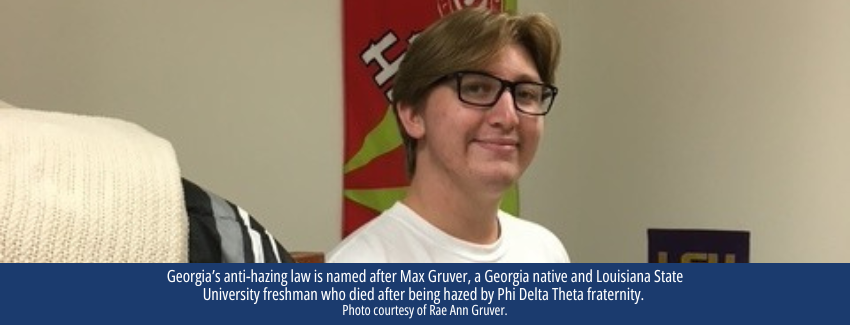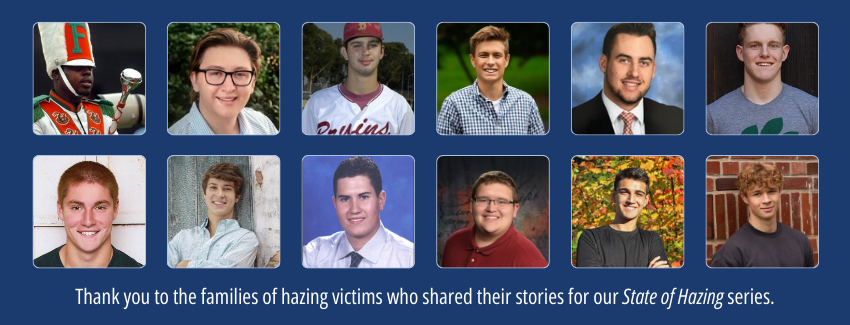65 hazing incidents since 2018: The state of hazing in Georgia
Only 19 of Georgia’s 55 higher education institutions are publicly reporting hazing incidents despite state law — with nearly half of those reports out of date

Editor’s note: This is part of our blog series, “The State of Hazing,” investigating the impact of hazing laws in nine states that require public disclosure of hazing incidents.
Georgia’s colleges and universities reported 65 campus hazing incidents across 15 campuses since 2018, according to a new HazingInfo.org investigation.
But just 35% of Georgia’s higher education institutions are publicly disclosing their hazing incidents despite a state law requiring transparency about hazing. And even many of the campuses that are complying with the law are reporting hazing data that is at least two years out of date.
 “That’s certainly disappointing,” said Georgia state Senator John Albers, who helped lead passage of the Max Gruver Act in 2021 requiring Georgia schools to report hazing incidents on their websites. “It’s straightforward, it’s the law, and they should know better.”
“That’s certainly disappointing,” said Georgia state Senator John Albers, who helped lead passage of the Max Gruver Act in 2021 requiring Georgia schools to report hazing incidents on their websites. “It’s straightforward, it’s the law, and they should know better.”
Albers pledged to follow up with Sonny Perdue, the chancellor of the University System of Georgia.
“I want to correct that right away,” Albers said. “If schools aren’t reporting, I have no problem holding their feet to the fire.”
Georgia is currently one of nine US states with laws or policies requiring campuses to post their hazing incidents online.
Across those nine states, the HazingInfo.org investigation found 946 reported incidents of hazing on 171 campuses between 2018 and February 2025. It is the first time the total number of reported US hazing incidents has been tallied.
Experts say the actual number of hazing incidents in Georgia, and across the nation, is almost certainly higher than what is being reported.
15 Georgia colleges report at least one hazing incident
HazingInfo found just 19 out of 55 Georgia colleges and universities with hazing incident reports publicly available on their websites.
Georgia college hazing data, 2018 to February 2025

Fifteen of those schools reported at least one hazing incident since 2018: Agnes Scott College; Albany State University; Dalton State College; Emory University; Fort Valley State University; Georgia College & State University; Georgia Institute of Technology; Georgia Southern University; Georgia Southwestern State University; Kennesaw State University; Mercer University; University of Georgia; University of North Georgia; University of West Georgia; and Valdosta State University. Other schools with published reports listed no hazing incidents.
Georgia State, the state’s second-largest university, is not in compliance with the law, providing only an empty, undated template on its student conduct page.
Similarly, Augusta University and Georgia Southwestern State University display empty tables as placeholders for potential hazing reporting. There are no dates and no information about hazing incidents, leaving students and parents guessing about the extent of campus hazing.
The HazingInfo investigation only included misconduct formally determined to be hazing by the institution. It omitted other kinds of misconduct like alcohol violations or assaults that weren’t officially labeled as hazing.
Forty-five out of 55 Georgia colleges and universities have a hazing policy, as required by law, while 37 campuses provide an online reporting form for students and others to report hazing.
No hazing reports? “Not believable”
“We all know hazing is happening all over, even with the work we’re all doing,” said Rae Ann Gruver, founder of the Max Gruver Foundation, an anti-hazing organization.
She and her husband, Steve, worked with Albers and other lawmakers to pass the Max Gruver Act after their son’s death from hazing in 2017. Rae Ann Gruver travels the country speaking to college and university students about hazing.
“Every time I’m on campus, kids come up and talk to me about the hazing going on,” she said.
As a former neonatal intensive care (NICU) nurse, Gruver said administrators at the hospital where she worked expected all errors, big and small, to be reported so the team could learn and improve. “Having no errors on the whole (NICU) floor was a red flag,” she said.
“How can you say you don’t have any hazing incidents, especially with these big institutions where we know hazing is still happening?” Gruver asked. “That’s the bigger red flag. It’s not believable.”
“This is for the students’ safety and for people making decisions to have the full picture,” she said.
“Students have to be more than a dollar sign”
 Hazing laws are only as good as their enforcement, noted Pamela Champion. She co-founded the Robert D. Champion Drum Major for Change Foundation, an anti-hazing organization in Decatur, Georgia, following the hazing death of her son, Robert, in 2011.
Hazing laws are only as good as their enforcement, noted Pamela Champion. She co-founded the Robert D. Champion Drum Major for Change Foundation, an anti-hazing organization in Decatur, Georgia, following the hazing death of her son, Robert, in 2011.
Robert was a drum major with Florida A&M University’s well-known Marching 100 band when he was beaten to death by fellow band members and alumni members as part of a hazing ritual.
Champion called Georgia’s overall compliance with the Max Gruver Act “shameful” and would like to see a formal audit of the state’s colleges and universities to ensure accountability.
 “What measures do we have in place ... to make our colleges and universities comply with putting that data out for people to see?" she asked. “We know if you don’t audit and fact-check and make sure, it won’t get done. It’s not really a high priority until something happens.”
“What measures do we have in place ... to make our colleges and universities comply with putting that data out for people to see?" she asked. “We know if you don’t audit and fact-check and make sure, it won’t get done. It’s not really a high priority until something happens.”
It’s too easy for schools to keep hazing incidents hidden unless someone is monitoring them, Champion said. “We know it’s under-reported. Settlements are made, which don’t get reported,” she said. “Students have to be more than a dollar sign.”
Georgia Southern University aims for greater transparency
Georgia Southern University had the highest number of reported hazing incidents in the state, with 13 incidents officially determined to be hazing between 2018 and 2025.
The information is spread across two different reports on the university’s website: a Max Gruver Act Public Disclosure page that includes campus hazing incidents from 2022 and 2023, and a chapter status page that only includes Greek organizations and shows hazing incidents dating back to 2015.
The most recent hazing incidents at Georgia Southern were reported in February. Two anonymous reports described forced drinking and physical assault by members of Pi Kappa Phi fraternity against other students. Those cases are currently under investigation and are not included in the university’s current reports.
Francisco Lugo, director of Fraternity and Sorority Life at Georgia Southern, described the university as “very visible and very transparent” about hazing. 
The university was among the first to publicly disclose hazing incidents in fraternities and sororities on its website in 2015, Lugo said, though the information doesn’t include specific details about the incidents other than the formal finding of hazing.
Georgia Southern started disclosing more details about hazing incidents after the Max Gruver Act became law in 2021. Lugo said the university has also engaged more with parents about hazing in recent years “because we see them as part of the solution.”
Still, most hazing reports Lugo receives are anonymous and don’t include enough information for the school to follow up. He believes the 65 hazing incidents reported across all Georgia higher education institutions is a low number.
“The ones that get media attention are the ones that get reported,” he said.
New federal law will require more disclosure about hazing
Other issues like lack of staffing capacity, experience, and knowledge by campus staff focused on hazing prevention also contribute to the gap in public reporting about hazing, Lugo said.
The commitment of campus leaders to hazing prevention is also critical, said Lugo, who has worked in fraternity and sorority life programs nationwide for more than two decades.
“It’s the message from the top. Does the president or vice president think it’s important?” he said. “I would rather have a smaller community (of Greek organizations) with chapters doing things right, than a larger community where chapters are doing whatever they want.”
All US colleges and universities will be required to publish hazing transparency reports on their websites by December following the recent passage of the federal Stop Campus Hazing Act.
The new law also includes a second requirement: Schools must make public the total number of hazing incidents reported to the school or local police — not just those that result in formal findings of hazing by campus authorities.
Those numbers, available by October 2026, will provide the clearest picture yet of the extent of campus hazing across the nation.
Learn about hazing on your campus: HazingInfo's Campus Lookup
Read more in our series about the State of Hazing in Louisiana, New Jersey, Ohio, Pennsylvania, South Carolina, Texas, Virginia, and Washington.




